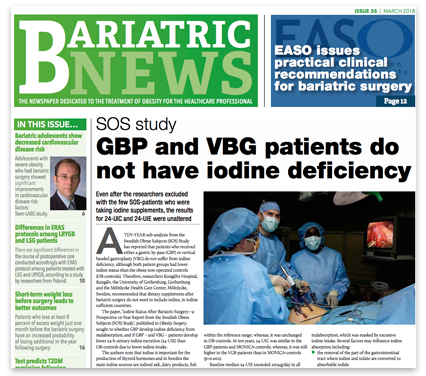State of Kuwait Ministry of Health publishes 3rd National Bariatric Registry Report>id/>
The State of Kuwait Ministry of Health and Dendrite are delighted to announce the publication of the 3rd Kuwait National Bariatric Registry Report 2023. This latest report, which includes 6,484 bariatric surgery cases, contains data on baseline obesity-related disease, operation types, operative outcomes and disease status after bariatric surgery in Kuwait.
“With the establishment of the National Bariatric Surgery Database, we anticipate that this report will guide policymaking, highlight expenditure, and aid in future planning with a vision to improve the quality of care. We aim to tackle the burden of obesity and its related comorbidities like dyslipidemia, hypertension, diabetes, sleep apnea, among others, and emphasize the benefits of bariatric surgery,” said Salman Al-Sabah, former Chairman of Surgery, Jaber Al-Ahmad Al-Sabah Hospital and Associate Professor of Surgery, Kuwait University, Kuwait. “A future aim remains to assimilate data from all surgeons and hospitals into a national registry. Meanwhile, we need to motivate participants to provide more comprehensive patient details. A pressing need for standardization in reporting various comorbidities is evident, which will be crucial to achieve accurate reporting and thus gather maximum information regarding the effectiveness of our surgical procedures.”
The Kuwait National Bariatric Registry is a collaboration between the State of Kuwait Ministry of Health and Dendrite. The registry uses Dendrite’s intuitive Intellect-Web registry software that facilitates the collection, recording and analysis of patient and procedural data from all bariatric procedures performed at the hospital including baseline demographic data, procedure type (including OAGB/MGB), all complications that might occur and also notes the severity of post-op complications (using the Clavien-Dindo classification). The system also takes into account the use of gastric balloons so that a subsequent first surgical procedure becomes a Primary Procedure and does not appear as a revision.
The Kuwait National Bariatric Registry currently comprises data being submitted from seven public hospitals (Al Adan Hospital, Al Amiri Hospital, Farwaniya Hospital, Jahra Hospital, Mubarak Al-Kabeer Hospital, Al Sabah Hospital and Jaber Hospital) by 102 surgeons. Of the 6,484 cases - 5,270 were primary procedures (81.3%), 874 were subsequent or revision operations (13.5%) and 340 were balloon insertions (5.2%).
Data collection was once again of a high quality; approximately 90% of entries for patients having their primary operation had either no missing data or one missing data item among a list of 10 obesity-related diseases assessed pre-operatively (including type 2 diabetes, back or leg pain, depression, impaired functional status, gastro-oesophageal reflux, raised blood pressure, dyslipidaemia, liver disease, sleep apnoea and increased risk of deep vein thrombosis or pulmonary embolism).
Key patient outcomes from the report showed:
- At the time of primary surgery, 72.0% of all patients are female.
- In Kuwait the patients have surgery at a younger age than most other countries; on average male Kuwaiti patients are 32.3 years old and female patients 32.9 years old at the time of their operation.
- Patients in Kuwait have a slightly higher BMI than the average reported from the IFSO Global Registry; the average BMI for a male Kuwaiti patient was 45.7 and for the average female patients it was 43.2.
- The bulk of the patient population (93.5% of males and 95.0% of females) presents with one to five obesity-related conditions.
- Over 93% of patients had impaired functional status pre-operatively.
- 29.0% of men and 25.1% of women have leg or back pain related to their weight.
- There were a large number of patients with type 2 diabetes (16.6% of the men and 12.5% of the women), which is a significant burden for the country’s healthcare system.
Key surgical outcomes from the report included:
- Most operations in Kuwait were sleeve gastrectomy procedures (94.3% of primary surgery), one anastomosis gastric bypass/mini gastric bypass was the next most commonly recorded operation (2.8%) and then Roux en Y gastric bypass (1.5%).
- In line with current accepted practice, almost all primary surgery was performed laparoscopically; only four operations were reported as having been converted to an open procedure.
- 7.2% of patients had an additional procedure concurrently with their bariatric surgery (3.6% cholecystectomy; 2.9% hernia repair; 0.1% liver biopsy; 0.8% another kind of minor procedure).
- Operative complication rates were low: 1.06% of patients had a related bleed and 0.06% had a staple line leak.
- Post-operative complications were also rare, considering the patients’ rates of obesity-related disease pre-operatively: 3.5% has a cardio-vascular complication and 5.2% had another complication.
The reported post-operative, in-hospital mortality was a very low 0.02%.
“It is with great pleasure that I commend this 3rd Report of the National Bariatric Surgery Database made available by Dendrite Clinical Systems. The Kuwait National Bariatric Surgery Database clearly demonstrates the safety and effectiveness of bariatric and metabolic surgery for treating patients with obesity in Kuwait,” said Dr Peter Walton, Managing Director of Dendrite Clinical Systems. “Furthermore, this initiative is helping the bariatric community establish essential benchmark knowledge, as well as track national trends in surgery, patient outcomes and the burden of comorbidities over time. I would like to thank all the contributors for submitting their data.”
About Dendrite
Dendrite Clinical Systems is a UK-headquartered international company with over a 30-year track record as a specialist provider of secure clinical registries, analysis software and consultancy services for the international healthcare sector, specifically for clinical research, multi-centre real-world studies, observational registries, international, national and hospital clinical databases.
Dendrite has been recognised as a leading provider of clinical registries across various specialties with a unique track record of implementing over 200 major clinical registry systems globally including systems for major research projects for medical device companies, CROs and pharmaceutical companies.
 Dendrite Clinical Systems’ unique and innovation clinical software is been employed for a new innovative Quality Improvement, Patient Safety and Research trial that is seeking to improve the quality of care delivered to patients requiring hip or knee joint replacement surgery by introducing two complimentary care-bundles for mild anaemia and Methicillin Sensitive Staphylococcus aureus (MSSA) into routine clinical practice.
Dendrite Clinical Systems’ unique and innovation clinical software is been employed for a new innovative Quality Improvement, Patient Safety and Research trial that is seeking to improve the quality of care delivered to patients requiring hip or knee joint replacement surgery by introducing two complimentary care-bundles for mild anaemia and Methicillin Sensitive Staphylococcus aureus (MSSA) into routine clinical practice. Dendrite Clinical Systems is to install its “Intellect System” to track outcomes of cardiothoracic surgery at the Cardiothoracic and Vascular Intensive Care and High Dependency Unit, Auckland City Hospital, Auckland, New Zealand. The establishment of a Dendrite system at the unit will improve the quality of data and coding quality by creating effective clinical data entry and reporting, and data validation.
Dendrite Clinical Systems is to install its “Intellect System” to track outcomes of cardiothoracic surgery at the Cardiothoracic and Vascular Intensive Care and High Dependency Unit, Auckland City Hospital, Auckland, New Zealand. The establishment of a Dendrite system at the unit will improve the quality of data and coding quality by creating effective clinical data entry and reporting, and data validation.  Dendrite Clinical Systems and the Society for Cardiothoracic Surgery in the UK are pleased to announce the SCTS Conference News 201 newspaper is now available to view/download. This is the third successive year Dendrite has published the newspaper on behalf of the SCTS. The newspaper reports a multitude of presentations from the meeting including the latest and the best information on new technologies and techniques in cardio-thoracic surgery.
Dendrite Clinical Systems and the Society for Cardiothoracic Surgery in the UK are pleased to announce the SCTS Conference News 201 newspaper is now available to view/download. This is the third successive year Dendrite has published the newspaper on behalf of the SCTS. The newspaper reports a multitude of presentations from the meeting including the latest and the best information on new technologies and techniques in cardio-thoracic surgery.  Dendrite Clinical Systems, the publisher of Bariatric News, is pleased to announce issue 35 of the newspaper is now available to view/download. The newspaper reports on research, technology, events and policy in the bariatric specialty, the latest clinical studies, policy changes and product news, the latest meetings and events, interviews prominent bariatric experts, and host debates between specialists on controversial topics.
Dendrite Clinical Systems, the publisher of Bariatric News, is pleased to announce issue 35 of the newspaper is now available to view/download. The newspaper reports on research, technology, events and policy in the bariatric specialty, the latest clinical studies, policy changes and product news, the latest meetings and events, interviews prominent bariatric experts, and host debates between specialists on controversial topics.


